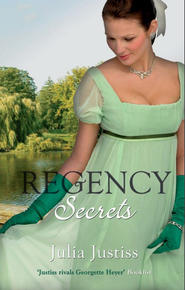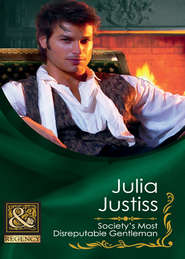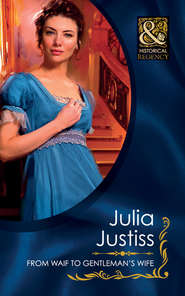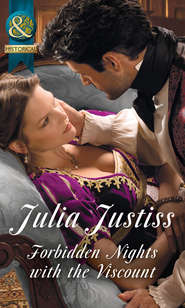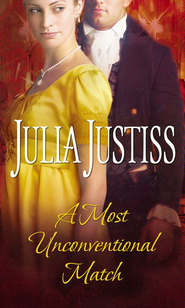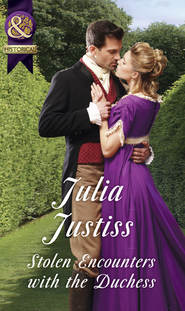По всем вопросам обращайтесь на: info@litportal.ru
(©) 2003-2025.
✖
Rogue's Lady
Настройки чтения
Размер шрифта
Высота строк
Поля
Will spread his arms wide. “Behold me occupying that position! Baron Penniless of Rack-and-Ruin Manor.”
Ignoring the bitterness in his tone, she nodded. “Exactly. You are still a baron. Uncle might have shamefully neglected the property put under his guardianship, but Brookwillow still possesses a stout stone manor house situated on a fine piece of land. Both need only an infusion of cash to put them to rights. You merely need to leave off pursuing light-skirted matrons and start looking for a wealthy bride. And I intend to help you find one.”
The idea was so preposterous, Will could not help laughing. “My dear, you are a dreamer! I hardly think I would be of interest to any respectable woman—unless she’s attics-to-let. Even should I manage to charm some tender innocent, no papa worth his salt would countenance my suit.”
“Nonsense,” Lucilla returned roundly. “You speak as if you were steeped in vice! You’ve only done what most young men do—game and seduce women all too willing to be seduced—albeit with a bit more flair. Indeed, I suspect Uncle Harold is proud of your reputation, though he’d never admit it. However, as head of the family, he will support your efforts to become established in good society.”
“He told you that?” Will asked, astounded.
“Why should he not? Since to do so,” she added dryly, “costs him neither time nor blunt. With your breeding and family connections, charming an innocent shouldn’t prove much of a challenge. You’re quite a handsome devil, you know, and what girl can resist the lure of a rake’s reputation?”
He stared at her a moment. “Given my ‘rake’s reputation,’ what does your lord husband have to say about your running tame with me?”
“You know Marcus always liked you, even when you were milling down every boy who whispered behind your back at Eton. He agrees that you ought to assume the responsibilities of your rank.” Lucilla giggled. “And knowing how he detests London, you may easily understand why he was happy to agree that you stand in for him as my escort to every party, ball and rout I choose to attend.”
“He trusts me that much—in spite of my reputation?”
Lucilla’s face grew serious. “He knows you would never do me harm—and so do I. Besides, the girls and their governess are with me, so we shall appear quite the family. Now, what we need to find you is a gently bred lass from the lower ranks. Despite Uncle Harold’s support, with your…limited means, ’tis best not to aspire to the hand of a duke or earl’s daughter. Perhaps a chit whose family wishes her to acquire a title…especially if she had a nabob grandfather to leave her his wealth!”
Holding up his hands, Will shook his head. “Lucilla my dear, I appreciate your kind intentions, but spare me! I’ve no desire to become a tenant for life.”
“What would you become, then? ’Tis past time to cease drifting as you have since leaving Oxford. Would it be so bad to find a kind, sensible girl to care for, who will care about you? One whose dowry will allow you to repair the manor house, refurbish your land and begin living as befits a Lord Tavener of Brookwillow?”
She gestured around the room. “You’ll never convince me you’d be sorry to give up this. Only think! Instead of a rented room—which hasn’t even a pianoforte!—you might recline in your own music room at Brookwillow. Become a patron of the arts, sponsor musicales and theatricals. Write music as you once did. Fill the library with all the rubbishy books you used to bring home from Eton and Oxford.” She giggled again. “Much to the horror of Uncle Harold.”
Will smiled. “The only thing more awful to our uncle than a nephew who wrote music was the idea of one becoming a scholar. I once choused him out of 200 pounds by threatening to accept a position as a don at Christ Church.”
“Did they really offer you a post?” Lucilla asked, diverted. “I think you might have been a good one.”
“No, I was wise not to accept it, even if I was angry at the time with Uncle Harold for not buying me that commission.” And despairing of what his future could offer, with a crumbling estate, no money and no chance to harness his few talents to earn any. “There wouldn’t have been any married ladies of wealth there for me to pursue.”
“True. But you’re bored with that now.”
He raised his eyebrows. “Am I?”
“Yes. Lydia reports you’ve not been involved in any new scandal for months. I understand you even rebuffed Lady Marlow’s quite flagrant lures.”
“Please, I beg you will not repeat that. Only consider my reputation!”
“No doubt ’twas your reputation as a lover that led her to pursue you.” She gave him a wicked look. “Employ those talents to charm your well-dowered maiden and you will both be happy! Marriage can be much more than a dreary arrangement based on wealth and position, as I can attest with great satisfaction.”
Hoping to throw her off, he gave her a lascivious look. “You certainly have the offspring to prove it.”
“’Tis another benefit of wedlock,” she replied, not at all embarrassed. “You might have a son.”
Will shuddered. “I can’t imagine anyone more ill-suited for the role of father. With my parents dead since I was a lad, what do I know about it?”
“You certainly know what not to do. Now, once the Season begins, I’m hosting a dinner for Lydia’s niece Cecelia, after which we will proceed to Lady Ormsby’s rout. You can make your first appearance then.” She cast a discerning eye over his attire and frowned. “It will give you enough time to get to the tailor and have some new garments made.”
“I am attending this rout, am I?”
Her face softened and she reached over to take his hand. “Dear Will, forgive me! I know I am terribly managing—which, I suppose, is what comes of running a household that includes a score of servants and three active children! I just want you to be happy, living in a place and a style worthy of you. I want you to have a chance to find the family you were robbed of as a child. I can’t make up for the lack of the commission or change the standards that forbid a gentleman from pursuing a career as a musician or scholar, but I can do this. Won’t you at least try to become respectable? If we don’t find an heiress to your liking, you can always go back to living the way you are now. What can you lose?”
“Several months of pursuing willing widows?” he suggested. But Lucilla was right. He was bored with the emptiness of his life, dissatisfied, restless, yearning for some indefinable something more.
He was by no means sure that acquiring a wife would satisfy those longings, however. “I doubt I have the temperament for matrimony,” he objected. “I’ve lived on my own so long, I don’t know that I could tolerate having a woman about all the time.”
“You’ve always enjoyed my company, haven’t you?”
He grinned. “Ah, but I don’t live with you day in and day out.”
“Well, married couples needn’t live in each other’s pockets, either. Indeed, much as I adore Domcaster, with his duties on the land and in town and mine with the house and children, we often go for days seeing each other only at dinner…or at night. Among all the young ladies on the Marriage Mart, surely you can find one who would be that congenial.”
“Perhaps,” Will temporized, not really putting much credit in that happy prediction. Certainly he had no illusions of tumbling into some great love match, as his cousin had. Save for Lucilla, the one relative who had inexplicably taken into her heart the fractious boy everyone else rebuffed, he knew about as much about familial affection as he did about fathering.
Indeed, the people to whom he was closest, he thought with a wry grimace, were neither of his own kin nor class. Barrows, now his valet and companion, a scruffy gutter rat he’d rescued when they were both boys. Maud and Andrew Phillips, the elderly caretakers of what was left of his crumbling estate, who’d shown him all he knew of parental affection. A pang of guilt pierced him that he’d not made the trip to Brookwillow to visit them in months.
Perhaps, if he could tell them he’d acquired the means to restore his ravaged estate and make easy their declining years, he might not be so reluctant to make the trip.
Even as he told himself it was highly improbable that Lucilla’s scheme could achieve that result, he heard himself say, “Very well, send me a card. I’ll make myself presentable and attend.”
“Wonderful!” Lucilla rose and gave him another hug. “Come for dinner next week. Domcaster is looking forward to talking with you.” As he walked her to the door she added, “I should have thought the last rich widow you dallied with would have kept a better kitchen. You look half-starved. You don’t need any money for the tailor—”
“No,” he interrupted, feeling heat flush his cheeks. Since his luck at the tables had been out of late, her comment about his ability to provide himself with food and raiment cut a bit too close for comfort. “My dear, my time with Clorinda was spent dining on delights far more arousing than any chef could devise.”
She batted his arm. “If you’re trying to put me to the blush, you’re all out. Domcaster says I have no sensibility at all. Very good! I’ll send you the invitation.”
He bowed. “As you command, my lady.”
“Stuff!” she said, making a face at him. “No, you needn’t see me to my carriage,” she added as he opened the door and made to walk her out. “My maid Berthe is waiting.” She pointed down the hall to a young woman who stood by the staircase, a liveried footman beside her. “Until next week, then. It is good to see you again, Will,” she added softly before she turned to stroll away.
“You, too, Lucilla,” he murmured, returning her wave before she disappeared down the stairs.
Slowly Will reentered his room and sat back down in his chair. Lord Tavener of Brookwillow Manor. Could he really become such a man? Restore his house, revive the land, take up his music again, build a true scholar’s library? Find someone who wished to share that life?
It seemed too good to be true…but in the last nine years, he’d not found any other way to achieve that dream. He discovered quickly enough after leaving Oxford that gaming, the only source of income open to a gentleman of no resources who wished to remain a gentleman, provided too irregular an income to facilitate the restoration of his birthright, nor after meeting his basic needs was there ever enough left to invest in some capital-generating venture. Nothing less than a substantial influx of cash—the sort that could be provided by the richly dowered bride Lucilla proposed to find him—could accomplish the task.
Already in poor condition at the time of his father’s death, Brookwillow had been too modest a property and too needful of time and serious investment to set it to rights to induce his uncle and guardian, the Earl of Pennhurst, possessed as he was of so many grander and more extensive lands, to bother with it. The last time Will had visited his estate, rain was dripping through the dining-room roof and birds nested in the upper guest chambers. The Phillipses managed to keep the servant’s quarters and kitchen habitable, but could do little with the rest.
As for the land, a few tenants still worked small plots around their cottages, but there weren’t nearly enough acres under cultivation to produce a saleable crop. Not that, after spending his youth at boarding schools, he had any idea how to go about transforming the estate into a productive agricultural property.
In short, his indifferent uncle’s provision of the bare modicum of a gentleman’s upbringing had left Will with few resources and no useable skills. His only innate talent, beyond music, scholarship and a way with cards and horses, seemed to be the ability to beguile bored women into his bed. Though at first that unexpected aptitude had amused him and kept loneliness at bay, of late, even this facility had lost its charm. And no matter how many sessions he battled every contender who dared challenge him at Gentleman Jackson’s, he could no longer box away the sense of emptiness inside.
While he was pondering the possibilities, Barrows walked back in. “So to what did we owe the honor of Lady Domcaster’s most improper visit?”
Will smiled. “It seems I am to become a respectable member of the gentry, Barrows. Leave off gambling, shun immoral women, and find a tender bud of an heiress who will embrace me willingly, love me madly and hand over her fortune so I can restore Brookwillow.”
Picking up the glass Lucilla had left, Barrows drained the last of the wine. “Do you know anything about charming a respectable maid?”






